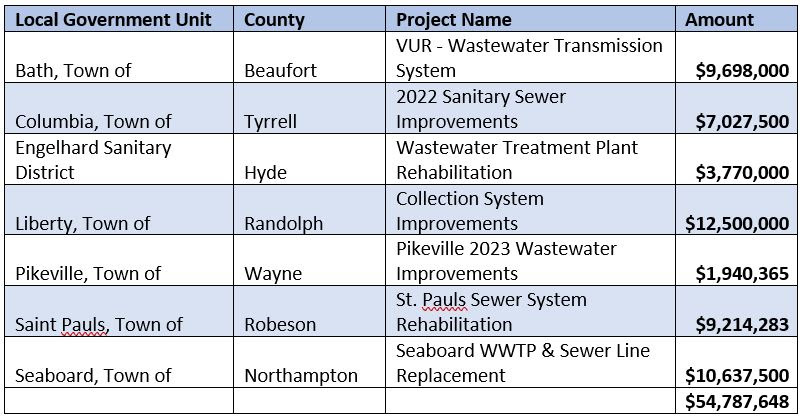Press Release:
(Raleigh, N.C.) The Local Government Commission (LGC) has signed off on $109 million in grants for drinking water and wastewater projects around the state, and to fund inventories and assessments of infrastructure assets in a number of other towns.
Money for the work falls under the Viable Utility Reserve (VUR) act passed by the General Assembly to help distressed local government units maintain, improve and replace public water and wastewater infrastructure, with a goal of working with other distressed local governments. The grants received required approval in February from the State Water Infrastructure Authority that operates under the auspices of the N.C. Department of Environmental Quality.
"A dependable source of clean drinking water and reliable wastewater systems are of the utmost importance for public health, environmental stewardship, quality of life and economic development," said State Treasurer Dale R. Folwell, CPA, who chairs the LGC.
"Many small towns and rural communities, in particular, as well as some urban centers face massive challenges providing those essential services due to shrinking tax bases and depopulation. The VUR is a vital stopgap to the decline."
Asset Inventory and Assessment Grants are conducted to determine the condition and needs of water and wastewater systems, to develop short-term and long-term action plans to keep the systems viable. Drinking water and wastewater grants pay for the physical repair, replacement and rehabilitation work. Grants approved by the LGC at its meeting Tuesday, March 7, were:
Asset Inventory and Assessment (AIA) Grants Funded from the Viable Utility Reserve (VUR) Approved by SWIA on February 21, 2023

Drinking Water Grants Funded from the Viable Utility Reserve (VUR) Approved by SWIA on February 21, 2023

Wastewater Grants Funded from the Viable Utility Reserve (VUR) Approved by SWIA on February 21, 2023

In other business on the agenda, the LGC approved a request from Pitt County to borrow nearly $17.3 million to construct an administration building for the Sheriff's Office in Greenville. The new building will allow the Sheriff's Office to consolidate employees under one roof instead of assigning them to multiple facilities.
Ground was already broken on the one-story, 35,000-square-foot building, which will be financed through an installment purchase contract that allows the county to make payments over time instead of in one lump sum.
The LGC, which is staffed by the Department of State Treasurer (DST), has a statutory duty to approve most debt issued by units of local government and public authorities in the state. The commission examines whether the amount of money units borrow is adequate and reasonable for proposed projects and confirms the governmental units can reasonably afford to repay the debt. It also monitors the financial well-being of more than 1,100 local government units.
LGC members voted in favor of a request from Winston-Salem (Forsyth County) to issue about $8.9 million in two-thirds general obligation bonds for street, bridge and lighting repair and replacement, parks and recreation facility improvements and maintenance, and other needs. A local government can issue this type of general obligation bond without a voter referendum if the sum is two-thirds or less of the reduction of the amount of debt in the previous fiscal year.
Wilson's Mills (Johnston County) got a green light from the LGC on $1.5 million in financing to buy 11.5 acres of land and five existing buildings as town departments expand. The town expects to hire an additional 10-12 personnel by 2025. The current Town Hall houses 31 employees in a 900-square-foot building that is over 100 years old and is at capacity.
Wake County's plan to refund $83.7 million in general obligation bonds to save nearly $4.3 million in lower interest costs was approved by the LGC.
The LGC gave a thumbs up to the Gastonia Housing Authority (Gaston County) for $8.9 million in additional financing for Fairhaven Place, a 200-unit affordable housing development. The LGC approved $39 million in financing at its October meeting, but construction costs have increased, resulting in the need for more money.
Members held a robust discussion about longstanding financial and leadership concerns with Elizabeth City, which has missed two cycles of submitting mandatory annual audits and cannot produce credible bookkeeping to verify how much money is in its accounts.
"The transparency, competency and governance needed to pull Elizabeth City out of the ditch is not there," Treasurer Folwell said. The situation has persisted despite the high volume of hours several DST employees from the State and Local Government Finance Division have been spending in efforts to assist the city.
"I would be more than happy to sit down with those leaders and have discussions," LGC member and state Secretary of Revenue Ronald Perry said.
No action was taken on the matter.
Contact:
Email: press@nctreasurer.com
Phone: (919) 814-3820



